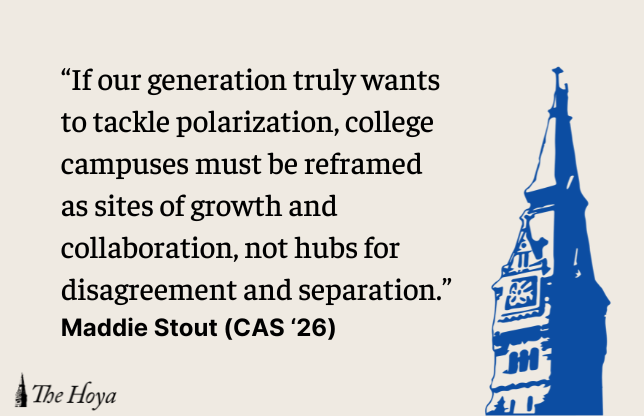College: a time for exploration, trying new things and meeting new people. It’s an era designed to encourage branching out and engaging with alternate viewpoints. And yet, we as a generation are further apart from each other than ever before.
There is something about college campuses that amplifies our nation’s fierce polarization, creating a strict blue and red divide.
Though universities aim to bring together people of different backgrounds, recent studies have illustrated that college students increasingly refuse to spend time with people of opposing parties.
From social media use to newspaper choice, political polarization affects all generations in our starkly divided world. It permeates every aspect of our daily lives — from Thanksgiving dinner topics to the harmful stereotypes determined by party lines.
However, as college students, we may be the most guilty of worsening the divide.
According to an NBC News and Generation Lab survey, nearly half of university student respondents in the Class of 2025 would not room with a person who supported a different presidential candidate running in 2020.
Even more concerning, Axios found that nearly a quarter of college students surveyed would not be friends with a supporter of a different candidate running in 2020.
If our generation truly wants to tackle polarization, college campuses must be reframed as sites of growth and collaboration, not hubs for disagreement and separation.
Although higher education institutions aim to widen our minds and introduce us to new ideologies, we are sheltering ourselves from one of the most valuable resources our schools provide: each other.
Considering Georgetown specifically — which has students hailing from all 50 states and over 100 countries — our fellow Hoyas could provide a wealth of information on different political backgrounds, viewpoints and cultures. Each one of us has individualized insights to offer, and by refusing to live, work and even speak with members of different political backgrounds, we forgo learning key collaboration skills. Not to mention, it contradicts the very commitment campuses claim to stand by: fostering and encouraging diverse education.
No one is exempt from this, and all students — including myself — are guilty of being caught in this echo chamber, succumbing to political “tunnel vision.”
It is easy to only speak to people of similar beliefs; everyone likes to talk to somebody who agrees with them. And, of course, there are occasions where beliefs extend beyond politics into the moralistic world — that makes sense.
But on a less individual level, this challenge should be easy to overcome.
For a group of such intellectually-curious individuals, we should be seeking out these hard conversations, rather than running away from them.
I can personally attest to this. Growing up in Texas, where a number of my peers had differing views from my own, I found that I actually learned the most when speaking to these people. New viewpoints encouraged me to rethink my own, and my curiosity led me to explore both sides of an issue.
On Georgetown’s campus, there are already a number of ways to help lessen polarization.
Take the Georgetown Bipartisan Coalition, for example, which states on its website a mission of “fostering healthy political discourse and creating an atmosphere of mutual respect.” By engaging with organizations such as this one, Hoyas can seek out different viewpoints and engage with them in a comfortable, respectful manner. Thus, students can be more confident in having these difficult, yet important conversations.
As of today, our generation is pessimistic about what’s ahead politically.
Last year, NBC found that only 34% of students felt confident about the United States’ future, a 14-point drop from the year before. With the world exploding in conflict and our nation heading toward another contentious presidential election, I fear that this number will continue to fall.
And yet, we are the ones who can change this — our generation is the future, and we know how things have gone wrong in the past. We can learn from our predecessors’ mistakes. And the obvious first step is alleviating polarization through critical discussion.
Maddie Stout is a sophomore in the College of Arts & Sciences.














